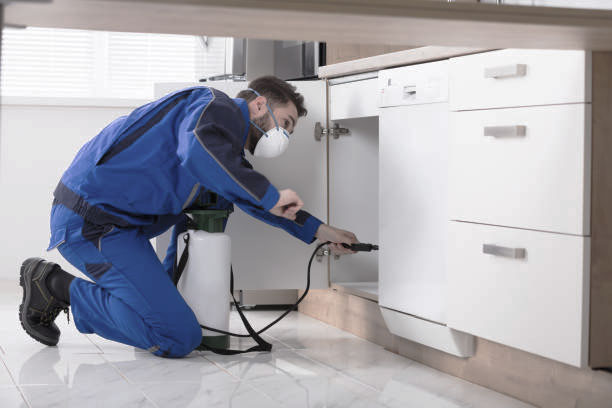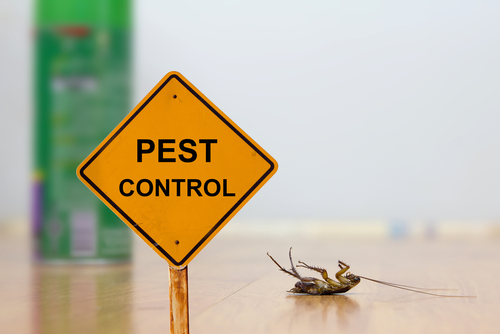If you’re reading this you’re likely looking to start an essential service in an industry with high demand year round. Clever move. In Australia, our flourishing insect ecosystem makes pest control an essential service. As of 2022, the industry has a market size of $1.4 billion and is expected to grow steadily. Starting a pest control business could very well be a sound financial decision that provides a stable, if not ever-increasing, income if you manage your finances and operations well.
Considering that the global pest control market is expected to grow at a compound annual growth rate of 5% in the period of 2023-2028, it makes sense to want to enter the market. Here’s how to start your own pest control business in 2023.
Get the right qualifications
Before you can go into pest control in most states in Australia, you have to obtain a pest controllers license that allows you to provide services to domestic and commercial customers. These requirements vary state by state and could include one of the following accredited courses (all offered by Rapid Training): the Certificate III in Urban Pest Management, Timber Pest Inspector course, or Timber Pest Manager.
You then need to get a pest management technician license through the correct state authority. In New South Wales for instance, the Environment Protection Authority provides a license that’s valid for 5 years. For more on getting the right qualifications, read our piece on How To Become A Pest And Building Inspector In Australia as well as Pest Licensing Changes For NSW.

Register your business structure
You have two choices on the level at which you enter the market when starting a pest control business. Either you can find and buy an existing business for sale, or set up your own. To set up your own business, you need to decide what type of structure it should be. Currently, there are 4 business structures in Australia:
- Sole trader
- Partnership
- Company
- Trust
There are pros and cons to each. For example, registering your operations as a company business structure makes it a separate legal entity, which means you’re not personally liable for any debts (as long as you don’t breach any legal obligations).
Australian legal site Lawpath has a handy business structure quiz you can do to find out which structure is the best for you. After you’ve chosen your best-fit structure, you must then register it. We highly recommend you do your research thoroughly and speak to a business expert before deciding on and registering your structure.
Starting a pest control business means defining your focus
Pest control encompasses a wide range of services – from snake removal to termite management to controlling rodents. The area you go into will dictate what equipment you’re going to need as well as your business’ branding. In order to set yourself apart from the rest of the local market, consider offering a service that’s differentiated in a meaningful way.
Find out what your competitors are doing and either improve upon existing services or offer your customers something new. For example, pet-safe pest control is a growing industry niche that you could look at exploring.

Get the right equipment
Your initial business start-up costs will go into setting yourself up for undertaking the jobs you’ll commit to. Regardless of your area of focus, you’ll need a vehicle so you can service customers at their properties. Ideally this will have branded signage to help advertise your services. The vehicle should preferably be a ute, van or truck so you can transport your equipment. Check out these common business car finance options explained before you make your purchase.
You’ll then need high quality equipment to do the job, including hose reels, spray tanks, storage boxes, and spill kits. Other items may include but in no way be limited to:
- Chemicals
- Personal Protective Equipment (PPE) such as gloves and masks
- Uniforms
- Traps, bait stations and cages
- Office equipment such as a computer, phone and filing systems

Market yourself when starting a pest control business
Once you have your business up and running, you’ll obviously want to attract customers to use your service. One of the best ways to put your name out there is by getting a website, as the vast majority of consumers research online before making a purchase or reaching out to a business. You’ll find this is the case even if they’re looking for a match locally.
To maximize your online visibility (a small website is enough in the beginning), consider investing in proper search engine optimisation. Rapid has some great resources on marketing, including:
Marketing 101: 5 Simple Ways To Promote Your Business
Online Business: How To Take Your Business Digital
5 Tips To Improve Your Website Ranking And Grow Your Business
Lessons To Help Yourself Avoid Customer Complaints
Get insured
Lastly, you never want to enter the pest control industry uninsured. It’s an essential step to making sure you and your business are safeguarded properly. Without pest control insurance, if anything goes wrong – like a job that didn’t deliver on promises or one that results in damage to property, people or pets – your business can be held liable for a LOT of money.
Contact Rapid Solutions today to find out about cost-effective professional indemnity insurance and general liability insurance and how much cover they provide your business. You can get in touch online or call us on 1300 309 169 to start your quote. Also be sure to read our article on how much does pest control insurance cost – it may be less than you think.

